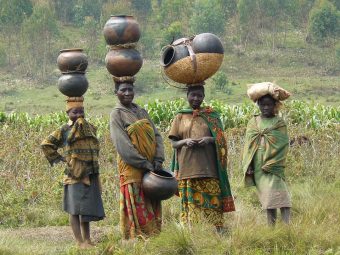
Changing precipitation patterns, rising temperatures and more extreme weather contributed to mounting food insecurity, poverty and displacement in Africa in 2020, compounding the socio-economic and health crisis triggered by the COVID-19 pandemic, according to a new multi-agency report coordinated by the World Meteorological Organization (WMO).
The State of the Climate in Africa 2020 report provides a snapshot of climate change trends and impacts, including sea level rise and the melting of the continent’s iconic glaciers. It highlights Africa’s disproportionate vulnerability and shows how the potential benefits of investments in climate adaptation, weather and climate services and early warning systems far outweigh the costs.
“During 2020, the climate indicators in Africa were characterized by continued warming temperatures, accelerating sea-level rise, extreme weather and climate events, such as floods, landslides and droughts, and associated devastating impacts. The rapid shrinking of the last remaining glaciers in eastern Africa, which are expected to melt entirely in the near future, signals the threat of imminent and irreversible change to the Earth system, ” said WMO Secretary-General Prof. Petteri Taalas in a foreword.
More:
“Along with COVID-19 recovery, enhancing climate resilience is an urgent and continuing need. Investments are particularly needed in capacity development and technology transfer, as well as in enhancing countries’ early warning systems, including weather, water and climate observing systems, ” said Prof Taalas.
The report is a collaborative product of WMO, the African Union Commission, the Economic Commission for Africa (ECA) through the Africa Climate Policy Centre (ACPC), international and regional scientific organizations and United Nations agencies. It is accompanied by a story map which highlights the key messages.
It is being released on 19 October during the Extraordinary World Meteorological Congress and ahead of the UN Climate Change negotiations, COP26. It adds to the scientific evidence about the urgency to cut global greenhouse gas emissions, step up the level of climate ambition and increase financing for adaptation.
«Africa is witnessing increased weather and climate variability, which leads to disasters and disruption of economic, ecological and social systems. By 2030, it is estimated that up to 118 million extremely poor people (i.e. living on less than US$ 1.90/day) will be exposed to drought, floods and extreme heat in Africa, if adequate response measures are not put in place. This will place additional burdens on poverty alleviation efforts and significantly hamper growth in prosperity, » said H.E. Josefa Leonel Correia Sacko Commissioner for Rural Economy and Agriculture African Union Commission.
“In sub-Saharan Africa, climate change could further lower gross domestic product (GDP) by up to 3 percent by 2050. This presents a serious challenge for climate adaptation and resilience actions because not only are physical conditions getting worse, but also the number of people being affected is increasing,” she said in the foreword.
Source: WMO


